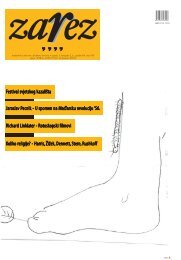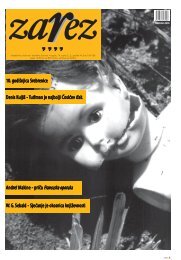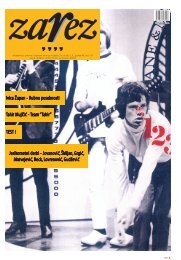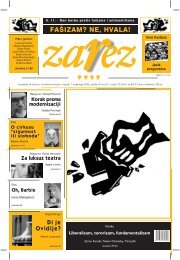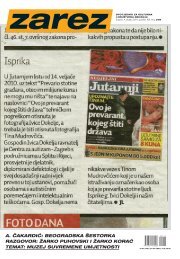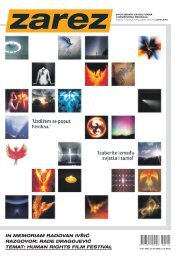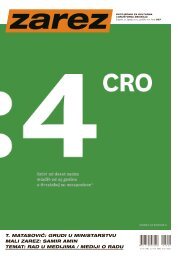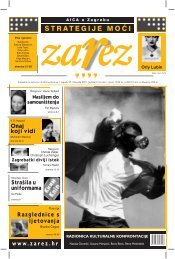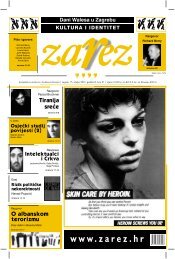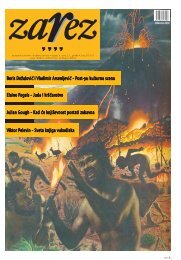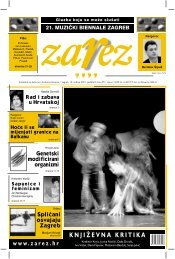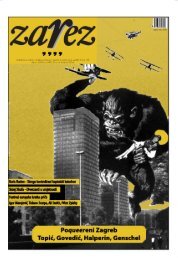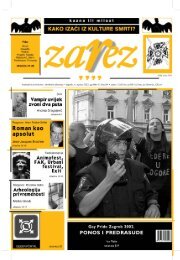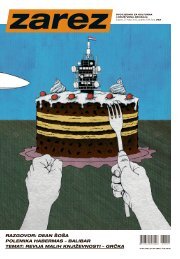Supplement Contemporary Croatian Literature, pp. 15 - 34 - Zarez
Supplement Contemporary Croatian Literature, pp. 15 - 34 - Zarez
Supplement Contemporary Croatian Literature, pp. 15 - 34 - Zarez
- No tags were found...
Create successful ePaper yourself
Turn your PDF publications into a flip-book with our unique Google optimized e-Paper software.
16 II/40, 12. listopada 2,,,.o you remember how thepanorama of <strong>Croatian</strong> literaturelooked like at the beginningof the nineties? As far asthe fiction goes, the frameworkwas clearly set. Its solid edges weredrawn by fiction doyens likeRanko Marinkoviæ and SlobodanNovak, whose works, in thoseslightly less productive years oftheir mature careers, were welcomedwith respect and interest.Right beside them, in the prime oftheir writing years, stood NedjeljkoFabrio and Ivan Aralica, as writerswith very different aestheticpreferences. In the name of themiddle-aged generation, still considered"young", stood PavaoPavlièiæ and Goran Tribuson: theauthors who worked stubbornlyin order to teach critics and readershow to a<strong>pp</strong>reciate the genre.The picture is complete when weadd the writers who used to publishin the literary magazine "Quorum",also known as the "exponentsof avant-garde tendencies", andwomen, usually identified with thephrase "female writing": Irena Vrkljan,Dubravka Ugrešiæ, SlavenkaDrakuliæ. All this brings us to aconclusion that we had everythinga literature must have: living classics,traditionalists, "trivial" writerswho in fact produced respectableliterature, young rebels and women.From today's perspective, Iadmit that the eighties seem like apretty good literary period to me:period that had inner criteria ofevaluation and poetic principlesone could discuss. How long wouldhave this idyll lasted if the historyhad not spoiled it? I cannoteven begin to guess the answer tothat question.Today's picture of <strong>Croatian</strong> fictionalliterature is far more heterogeneousand it does not readily lenditself to neat systematization.The question of "what ha<strong>pp</strong>enedin <strong>Croatian</strong> fiction during the nineties"is easy only from the statisticalpoint of view. Many new authorsha<strong>pp</strong>ened, and while the oldergeneration from the eightieshas endured, what is completelylacking is their hierarchical inter--evaluation. It would be more accurateto say that the older writerssurvived by choosing entirely autonomouscareers, without thecommon denominator of "poetics"or genre. Politics also had playedthe role in literary history: Aralica,for example, achieved separate statusby becoming a "court writer",while the female writers werebranded as "witches" and dissidents.Nevertheless, the events in<strong>Croatian</strong> literature of the ninetiesare not to be equated with movingthe same figures around the predeterminedchessboard. We cannotcompare <strong>Croatian</strong> literature tochess: its participants are not merely"figures", but persons whomight change and whose numberis not limited. Nor are the rules ofthe game fixed or strict: the writingspace is open-ended, and rulescan change on the spot.Time of documents or documentsof timeThe first time I attempted towrite about <strong>Croatian</strong> literature ofthe nineties in a systematic fashion,it was for the special issue ofthe “Dubrovnik” journal (editedby Vlaho Bogišiæ) and entitled“Documentarity in <strong>Contemporary</strong><strong>Croatian</strong> <strong>Literature</strong>”. Undeniably,the growing number of <strong>Croatian</strong>autobiographical and documentarytexts in the first half of the ninetiesshifted the weight towardthe factual, and away from the fictionalelements of the text. Regardlessof whether we consider literatureof the nineties a "documentof the times" or a consequence of"the times of documents" - whatcannot be denied is the fact thatwe are surrounded by texts thattestify about factuality. From theperspective of literary writing, thebeginning of the nineties was markedby eljka Èorak's book Shardsand Pavlièiæ's Šapudl, while thetheoretical scene noted the a<strong>pp</strong>earanceof Dubravka Oraiæ-Toliæ'sbook <strong>Literature</strong> and Destiny. Èorak’sShards was probably the firstbook to narrate the fragments of asmall, shattered and private story.Šapudl revealed Pavlièiæ's transformationfrom the fantasy to autobiographicalwriter, and Oraiæ-Toliæ'sbook opened the discussionabout the relationship betweenfiction and reality. The centralgenre of the first part of the ninetieswas, however, the essay: acomplex form that merges the fictionalwith reflexive, and autobiographicalwith theoretical elements.In the first part of the decade,the essay genre, and now Irefer to anything from newspapercolumns to literary essays, becamea dominant mode of "reading reality"and writing about it: Barricadesby Boris Buden and Culture of Liesby Dubravka Ugrešiæ are the highestachievements in the genre.The second half of the nineties alsohad its masters of essayisticLiterary Time:The PresentIn the course of ten yearsof literary metamorphoses,how did we reach thegenre destination of refugeeconfessions and warnovel?Andrea Zlatarwriting: see books of collected columnsby Ivo aniæ, ZvonimirBerkoviæ, Viktor Ivanèiæ and SlobodanŠnajder.As a whole, these are the imaginaryframes of documentary andfactual literature of the ninetieswithin which the existing textsmay be placed:- anthologies of different documentsand testimonies (thematicallyexpanding on displaced peopleand refugees, war operationsetc.)- political journalism and feuilletonwritingThe central genre ofthe first part of thenineties was,however, the essay:a complex form thatmerges the fictionalwith reflexive, andautobiographicalwith theoreticalelements- numerous war journals (fromŠimunoviæ and Grugurovac toeljko Ivankoviæ and Ivan Lovrenoviæ)- autobiographical fiction.The last group, autobiographicalfiction, has undergone two stages.The first one is characterizedby simple autobiographical forms,uninterested in producing a fictionalmodel of story or conceiving acharacter. Slavica Stojan’s StoryAccording to Pavle is a good example.Basic characteristic of the firststage (until 1995) of <strong>Croatian</strong> literaturein general is its lack of distance,the lack of chronologicaldistance from the reality of war,which caused further lack of fictionalnarration. Fictional frame isoften perceived as something "unnatural";as an aggressively addedmarker of "art" that the "raw" realitydoes not really require. This periodwas therefore free of patheticand implicitly apologetical literature;the patriotic kitsch mostlyresided in lyrical poetry for specialoccasions and commemorativeeditions. Stories from refugee anthologieswere too painful and tragicto tolerate any fictional ornamentation.To make a long storyshort: testimonies about rape andethnical cleansing can be ideologizedonly after they are distancedfrom their authentic narrators.Autobiographical war fictionIn the mid-nineties, urbanbookstores started featuring new"war discourse" books on an almostdaily basis - for the most part,their authors had no literary background,and their names were oftenfamiliar from television reportson the war. Thus, the anticipatedproduction of "soldier literature"came into full bloom, includingmany memoirs and other worksthat were clearly intent on "documenting"historical events. Thenthe first books trying to transposethe factual into fictional cautiouslya<strong>pp</strong>eared. Pavle Kaliniæ's NeitherA Colonel, Nor A Corpse was probablyone of the first. Kaliniæblends documentary narration,political commentary and confessionalreflections. The dominanttone is personal, emphasizing thepersonally experienced elementsand leaving the impression of anauthentic, immediate testimony.Kaliniæ's second book, Requiem forOne Youth, My Grandma and USA(1996) already has a structure ofthe novel: narrative distance is establishedby creation of fictionalcharacters, and enunciation is nolonger burdened with political "reporting"and analysis. This line ofwriting was further developed byAlemka Mirkoviæ and RatkoCvetniæ, two authors who - in criticalreception - finally crossedover to the fictional pole of literature.The fact that both of themhad no previous literary experiencepresented no obstacle to theiraward winning, critically acclaimedstatus. Their huge popularitywith reading audience and the purecommon sense of critics finallytriumphed over the traditionalacademic resistance towards autobiographyand other "non-literary"genres. Both authors are neverthelessreproached for being "tooopen" about their privacy, sometimes"banal and too preoccupiedwith everyday things", "overlyrooted in history" or "lacking instyle". Well, these prejudices werethe norm of reception for all autobiographicalfiction in the nineties.91,6Mhz: A Voice That DefiedThe Cannons by Alemka Mirkoviæis a retrospective narrative thatweaves real characters into a fascinatingplot, and Cvetniæ's A BriefOuting comes off as a sophisticatedessayist fiction that builds narrativecontinuity on the basis ofunity of narrator's consciousness,not by the fictional plot. AlemkaMirkoviæ and Ratko Cvetniæ wereimportant not only contextually,as a proof that writing about warwas possible even when professionalMuses were being silenced, butalso because they returned thenarrative focus to individual perspective.Their narrators - not accidentallyin the first person - arelonely and isolated individuals,who, forced to follow the historicalevents on foot and step bystep, slowly lose illusions abouttheir universal importance. InMirkoviæ and Cvetniæ these individualfigures gradually realize thatthe tragic scale can be fully measuredonly when each single, individualstory is taken into account."Minor narration" has overpowered"master narration", paving theway for novels. Since bothMirkoviæ and Cvetniæ publishedtheir books in 1997, this could beseen as the year when the long,predominantly factual period ofthe <strong>Croatian</strong> literature in the ninetiesfinally ended. The space wasopen for the central protagonist offiction writing in the second partof decade: Miljenko Jergoviæ. Hisbooks (Sarajevo Marlboro, Karivans,Mamma Leone) offer a writingmodel for the future. This is urbanfiction with elements of the confessional,autobiographical discourse.Critics who see Jergoviæ asa foreign body in <strong>Croatian</strong> literatureusually cite numerous contradictoryarguments: he is suspectbecause he writes about Sarajevoand Bosnia, because he often writesfor newspapers and magazines,because his language is “impure”(i.e., it does not adhere to the “purist”,pompous standard <strong>Croatian</strong>),because his ethnicity is unclear.All these petty arguments(an unavoidable and logical consequenceof understanding <strong>Croatian</strong>literature in self-sufficient terms)open questions with conflictingvalue charges: how else can wemeasure someone's presence in thegiven culture, except by his/her artisticinfluence and popularity withwider audience? Jergoviæ certainlyhas both.At last: novel as fictionCritics seemed to breathe a sighof relief when, in 1998 and onwards,the book market was finallyable to once again offer novelswhich, "from beginning to end",really were novels. No longer vacillatingbetween autobiographyand fiction, or between documentaryand art, the new generationstarted writing genre fiction, stillthematically rooted in time andspace of the war, but employingfictional models in their choice ofnarrative strategy. Jurica Pavièiæ,Ante Tomiæ, Igor Petriæ and JosipMlakiæ transformed the experienceof war into the fictional formsof the novel, mostly written in thirdperson. Their writing clearlyshows the influence of Europeantradition of war novels, and theirplot models are inherently cinematic.Economy of expression andrealistic narrative patterns inPavièiæ and Tomiæ represent a definitedeparture from the <strong>Croatian</strong>novel structures inherited fromthe eighties, i.e. from the fantasticalor historical subjects and highlyaestheticized narrative styles.On the other hand, it is exactly thefictional heritage of the eightiesthat allowed the formation of gen-



